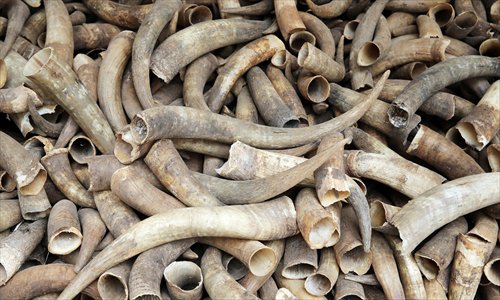As survey shows 77% believe cruel TCM practices should stop, firms under pressure
For centuries, traditional Chinese medicine (TCM) cures have included animal body parts, such as rhinoceros horns, black bear bile or deer antlers. Recently, concerns over animal protection have become more common, and those who manufacture the ancient medicine are being pushed to make changes.

Doctors prepare prescriptions in a TCM hospital. Photo: IC
A recent report from the Ta Foundation, an animal rights NGO, which found that highly paid, well-educated people are the most likely to use, and oppose the use of, products made from controversial animal parts such as black bear bile, has reignited the perennial debate over the ancient system.
"The report showed that the major buyers of bear bile products work in the media, finance and medical sectors and most of them are young people, even though they are aware of the cruelty," said Zhang Xiaohai, executive secretary-general of the Ta Foundation.
The report found that about 77 percent of 1,892 respondents from 27 cities said "the cruel behavior should be stopped" while 21 percent were aware of the brutality of the extraction process but believe that there is no alternative way to collect the medicines.
Using the data to show that such TCM medicines are losing popularity, the NGO has demanded TCM companies stop producing these products.
In recent years, animal rights groups' criticisms of TCM companies have become louder and louder, urging the firms to stop using rare animals and plants in their products - a practice they regard as both cruel and destructive.
Some companies have started raising their own animals or growing their own herbs instead of taking them from the wild, so they can sell medicines that many people believe are beneficial without damaging the ecosystem. But activists are pushing for more.
Traditional view
Despite the controversy, products made from animals are not hard to find. A simple Baidu.com search returns thousands of results including "authentic deer antler and bear bile."
Fang Chiqiu, a Beijing resident, said he knows his landlord buys deer antlers from acquaintances. The landlord, a billionaire real estate developer, buys these materials and processes them himself into healthcare products and then eats the end result.
Ancient TCM texts describe a variety of animal parts as having medicinal qualities, including tiger bones, black bear bile and deer antlers, and explain how they should be used.
For example, Bencao Gangmu, a classical TCM text written by 16th Century herbalist Li Shizhen, describes tiger bones as being able to cure all sorts of aches and animal bites, and deer antlers as curing weakness, dizziness and fatigue.
Till this day, these animal parts are still regarded by many in China as the most effective way to defeat disease, despite - or perhaps because of - the steep price tag. A single gram of bear bile can be sold on the market for more than 100 yuan ($15).

Water buffalo horns that are used to substitute rhinoceros horns in TCM. Photo: IC
TCM under fire
In recent years, the media and animal protection groups have pushed for a ban on trading and medical uses of these animal body parts.
One widely reported case is the consumption of the endangered devil ray. According to WildAid, an NGO based in San Francisco, over 90 percent of devil ray sales occur in Guangzhou, South China's Guangdong Province. Conservationists believe this trade is threatening the very existence of the species.
Black bear bile is another topic that has garnered increasing attention in recent years due to its cruelty. In order to extract the bile, a metal tube is inserted into the bear's gallbladder, with the other end permanently and painfully sticking out of the bear's skin, dripping bile which is then collected.
Right now, there are more than 20 types of medicine that use black bear bile as an active ingredient.
The Ta Foundation's Zhang Xiaohai said beside the cruelty, the NGO also opposes the black bear bile medicines because it doesn't have the advertised effect. Besides, many of the bears treated this way are diseased and their bile can cause cancer.
A TCM doctor in Nanjing University Hospital in East China's Jiangsu Province told the Global Times that he doesn't think such ingredients are completely necessary for the development of TCM. In fact, some ingredients are overrated.
"There are many different kinds of traditional medicine, there is more than one ingredient that can treat a disease," he said.
But this point of view is not universal. Qiu Yingjie, secretary-general of the committee for the protection and exploitation of animals in medicine under the Association of Traditional Chinese Medicine, said such medicines have been used for a long time and have proven to be precious and effective.

Finding balance
Over the years, animal protection activists and TCM advocates have been involved in a long-term tug-of-war.
In the face of this pressure, TCM companies have been making adjustments to create a legal and sustainable supply chain for their products, Qiu said.
Last year the national TCM association brought 15 TCM companies together to sign a pledge that says they will only use animal parts and plants legally and will refuse to use wild materials.
"There are many companies that have started keeping their own farms, such as deer farms or black bear farms," Qiu said. This way, it's not an illegal activity and TCM companies can still develop.
Another way to avoid this debate is to come up with substitute ingredients.
In 1993, China became a member of the Convention on International Trade in Endangered Species of Wild Fauna and Flora. That year, the State Council released a document completely banning the trade of tiger bones and rhinoceros horns.
To deal with this situation, TCM companies have had to come up with creative solutions. In 2003, after more than 10 years of experimentation, TCM company Tongrentang and the Shenyang TCM company released a medicine that contains artificial tiger bone.
In another case, in order to sustainably develop TCM, some medical companies have pledged not to overexploit resources.
Weikang, a Zhejiang Province-based company that makes traditional medicine from wild herbs, signed a pledge in 2013 with TRAFFIC, a wildlife monitoring network under the World Wildlife Fund, to participate in a project that sustainably develops certain types of plants.
"It's a win-win situation for both the company and wildlife protection agencies," said Wei Dewei, Weikang's CEO.
In these couple of years Weikang has held many training seminars for farmers and herb pickers about not over-picking five types of herbs and keeping the industry sustainable. Furthermore, Weikang has established medical bases to grow these herbs.
At the same time, the Chinese government has worked to push the development of legal framework for TCM.
The State Council released China's first national plan on the protection and development of TCM resources in April 2015. The plan was jointly released by 12 government agencies and covers goals from 2015 to 2020.
During the two legislative sessions this year, seven advisors from the Chinese People's Political Consultative Conference suggested the draft Wildlife Protection Law should regulate the medical use of animal parts, such as black bear, tiger or rhinoceros. Animal rights activists attacked this proposal, arguing that it would give a legal basis for practice they say should be illegal.
The advisors are all directors of TCM research academies or directors and doctors at TCM hospitals and they believe restricting the use of these materials would hinder the development of TCM.
Still debates
There's still controversy in some legal areas. For example, even though black bears are a second-class protected species according to China's wildlife law, as long as companies have government permission to raise and use the animals for commercial purposes, their exploitation is allowed.
The Ta Foundation calls for a complete ban on bile extraction, and hopes to meet with relevant companies as well as government organs in order to reach a compromise or find alternative solutions to the matter.
In the report the Ta Foundation released, it showed only a small crowd still pursues the product, making it unnecessary for companies to keep producing it. But people in the TCM business certainly don't think so.
"It's definitely not possible to not use these ingredients at all," Qiu said. "If protection went well but there's nothing for the companies to use, no medicine for people to consume, that can't work either."
He thinks it's ridiculous to call for a total ban because of animal cruelty, but says the legal system should be based on licensing and law. He said companies should be inspected to see whether they have licenses to keep and raise animals, and if they have a license from the China Food and Drug Administration to produce medicine. If they have both, there should be no legal issue.
"We would like to protect first, but we need to exploit these resources," he said. "Otherwise we'll have nothing left to use."
Newspaper headline: Bone to pick